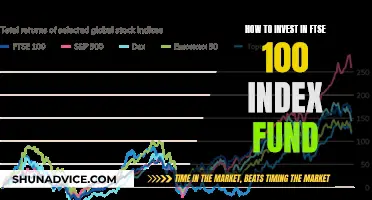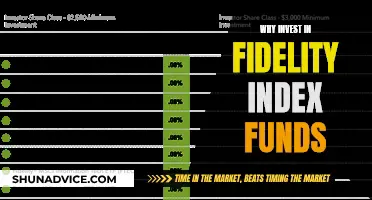
In his book 'How to Invest in Hedge Funds: An Investment Professional's Guide', Matthew Ridley provides a comprehensive and accessible guide to investing in hedge funds. With his extensive knowledge of the hedge fund industry, Ridley offers a uniquely balanced approach, outlining both the advantages and failings of this kind of fund. The book covers a range of topics, including the definition, origin, structure, and life cycle of a typical hedge fund, the risks and merits of hedge funds, portfolio construction and management, and how to select a hedge fund. Published in 2004, the book has received praise from industry professionals for its clarity, insight, and practical value.
What You'll Learn

Definition, origin, structure and life cycle of a hedge fund
Definition
A hedge fund is a limited partnership of private investors whose money is pooled and managed by professional fund managers. These managers employ a wide range of strategies, including leverage (borrowed money) and the trading of non-traditional assets, to achieve above-average investment returns. The term "hedge fund" refers to an investment instrument with pooled funds that is managed to outperform average market returns.
Origin
The first hedge fund was launched in 1949 by Australian investor Alfred Winslow Jones through his company, A.W. Jones & Co. Jones raised $100,000 and designed a fund that aimed to minimise the risk in long-term stock investing by short selling, now known as the long/short equities model. In 1952, Jones converted his fund to a limited partnership, added a 20% incentive fee as compensation for the managing partner, and became the first money manager to combine short selling, the use of leverage, and a compensation system based on performance.
Structure
Hedge funds are actively managed funds focused on alternative investments that commonly use risky investment strategies. They are not as strictly regulated by the U.S. Securities and Exchange Commission (SEC) as mutual funds. Hedge funds typically require accredited investors and a high minimum investment or net worth, targeting wealthy investors. They charge higher fees than conventional investment funds, employing a standard "2 and 20" fee system, which refers to a 2% management fee and a 20% performance fee.
Life cycle
According to the Goldman Sachs' Hedge Fund Survivorship 2020 report, most hedge funds have a lifespan of about six to seven years. It is generally observed that younger, smaller funds tend to outperform older, larger funds. This can be attributed to various factors, including the ability to exploit newer market anomalies, trade in illiquid securities, and maintain a lean and nimble structure. As hedge funds mature, they may experience a "sweet spot" in their life cycle, where they have addressed operational concerns and established robust business processes and risk management controls. However, as funds age further, they may encounter challenges such as increased competition, style drift, and a decline in entrepreneurial motivation, potentially leading to reduced returns.
Bond Funds vs Individual Bonds: Pros and Cons for Investors
You may want to see also

Risks and merits of hedge funds
Hedge funds have become an increasingly popular alternative asset class for investors, particularly in the wake of disappointing returns from mainstream markets. In his book, 'How to Invest in Hedge Funds: An Investment Professional's Guide', Matthew Ridley outlines both the risks and merits of this kind of fund.
Risks of Hedge Funds
Hedge funds are a specialist area, and while they can be largely immune to market fluctuations and even profit when prices are falling, investing in them is not without risk. Hedge funds can be less liquid than other investments, and they often require quick decision-making and efficient execution. They may also have higher risk and exhibit wider distributions of outcomes than traditional fund investments.
Merits of Hedge Funds
Hedge funds offer the potential for high returns, even when markets are performing poorly. They are also less correlated to traditional asset classes, meaning they can provide diversification benefits to an investment portfolio. Hedge funds can be a good way to target specific exposures and risk/return profiles that meet an investor's objectives. Additionally, they can provide improved fees, transparency, and control rights compared to other investments.
Factors to Consider
When considering investing in hedge funds, it is essential to weigh the risks and merits carefully. It is also important to note that hedge funds are a complex and diverse asset class, and it is recommended to seek out educational resources or consult a financial professional before making any investment decisions.
Vanguard Traditional IRA: Best Funds for Your Retirement Savings
You may want to see also

How to select a hedge fund
Selecting a hedge fund is a crucial aspect of investing in these alternative investment vehicles. Here are some key considerations and steps to help you make an informed decision:
- Understand your investment goals and risk tolerance: Before selecting a hedge fund, it's important to define your investment objectives and risk appetite. Hedge funds employ various strategies, and some may be more aligned with your goals than others. Assess your tolerance for risk and volatility as hedge funds utilise aggressive investment strategies that can be riskier than traditional investments.
- Conduct thorough research: Research potential hedge funds by reviewing their performance track records, investment strategies, management teams, and fees. Evaluate their historical returns, the types of investments they focus on, and the expertise of their fund managers. Look for funds with consistent performance that aligns with your goals.
- Evaluate the fund's strategy: Hedge funds employ different strategies, such as market neutral, event-driven, relative value, or directional. Understand the specific strategies employed by the fund and assess if they match your investment objectives and risk tolerance.
- Consider the fund's size and track record: Assess the fund's assets under management and its performance over time. A larger fund size may offer more stability, while smaller funds might provide more flexibility and niche investment opportunities. Look for a consistent track record of performance that meets or exceeds industry benchmarks.
- Review the fund's fees and expenses: Hedge funds typically charge management and performance fees. Evaluate these fees to ensure they are competitive and in line with the industry standards. Understand all associated costs, as these fees can impact your overall returns.
- Assess the fund's management team: Evaluate the qualifications, experience, and track record of the fund's management team. Look for experienced professionals with a successful history in the industry. Assess their ability to make sound investment decisions and navigate different market conditions.
- Compare multiple hedge funds: Don't settle for the first fund you find. Compare and contrast several hedge funds to identify the one that best suits your needs. Consider their strategies, performance, fees, and management teams to make an informed decision.
- Seek professional advice: Consult with a financial advisor or a hedge fund expert to gain additional insights and guidance. They can provide personalised advice based on your financial situation and help you navigate the complexities of selecting a hedge fund.
By following these steps and conducting thorough due diligence, you can make a well-informed decision when selecting a hedge fund that aligns with your investment goals and risk tolerance. Remember to always carefully consider the risks and potential rewards before investing.
Mutual Funds: Best Investment Option for Your Money
You may want to see also

Portfolio construction and management
Matthew Ridley's book, *How to Invest in Hedge Funds*, provides a comprehensive overview of portfolio construction and management in the context of hedge fund investing. Here are some key insights and instructions from the book:
- Ridley emphasizes the importance of understanding the definition, origin, structure, and life cycle of a typical hedge fund before constructing a portfolio. This foundational knowledge will help investors make informed decisions about which hedge funds to include in their portfolio.
- The book offers practical guidance on how to select individual hedge funds that align with an investor's goals and risk tolerance. It covers the risks and merits of hedge funds, providing a balanced perspective on their strengths and weaknesses.
- Ridley dedicates chapters to explaining specific hedge fund strategies, such as market influences, opportunities, and potential challenges associated with different approaches. This includes discussions on various types of hedge fund strategies, such as convertible arbitrage, fixed-income arbitrage, distressed securities, and global macro strategies.
- When constructing a hedge fund portfolio, diversification is key. Ridley suggests considering a range of hedge fund strategies and selecting funds that employ different approaches to mitigate risk and maximize returns.
- The book also addresses the importance of monitoring and evaluating hedge fund performance. This includes guidance on organizing a hedge fund research effort, including resources and tools that can aid in ongoing analysis and decision-making.
- Ridley's extensive experience in the hedge fund industry, as both an analyst and a funds portfolio manager, shines through in his practical advice and insights. He offers a step-by-step guide for professionals investing in hedge funds for the first time, ensuring they have the knowledge and skills needed to construct and manage a robust portfolio.
- Additionally, the book may provide insights into the timing of investments, such as taking advantage of market downturns or specific economic conditions that hedge funds aim to capitalize on.
- Ridley also emphasizes the importance of due diligence and provides suggestions for resources and academic papers that can aid in making informed investment decisions when constructing and managing a hedge fund portfolio.
Municipal Bond Investing: Vanguard Funds for Beginners
You may want to see also

How to organise a hedge fund research effort
The following is an adapted extract from Matthew Ridley's book, *How to Invest in Hedge Funds: An Investment Professional's Guide*, which provides a step-by-step guide for investment professionals.
Ridley suggests that organising a hedge fund research effort involves understanding the following:
- The definition, origin, structure and life cycle of a typical hedge fund. This includes the various types of hedge funds, such as equity long-short funds, distressed securities funds, and global macro and CTAS funds.
- The risks and merits of hedge funds, including the potential for high returns, but also the volatility and illiquidity that may come with these investments.
- How to select a hedge fund, including the process of evaluating and analysing different funds, and the role of a hedge fund manager.
- Portfolio construction and management, including the different investment strategies that can be employed, such as market influences, opportunities and potential problems.
- The specific research methods and tools that can be used to evaluate hedge funds, such as academic papers, statistics, factor analysis, and performance tracking.
By understanding these key areas, investment professionals can effectively organise their research efforts and make informed decisions about investing in hedge funds.
Mutual Funds: Not a Get-Rich-Quick Scheme
You may want to see also
Frequently asked questions
The book provides a uniquely balanced picture that outlines both the strengths and weaknesses of hedge funds. It is a practical, step-by-step guide for professionals investing in hedge funds for the first time.
The book covers the following topics:
- Definition, origin, structure and attributes of a typical hedge fund
- Risks and merits of hedge funds
- How to select a hedge fund
- Portfolio construction and management
- How to organise a hedge fund research effort
- Chapters dedicated to explaining specific hedge fund strategies
Matthew Ridley has been in the hedge fund selection industry since 1994 when he joined Liberty Ermitage. He has extensive knowledge of the hedge fund industry, both as an analyst and as a funds portfolio manager.
The book has received positive reviews, with some describing it as an "excellent", "insightful" and "readable" introduction to hedge funds. It has been praised for its comprehensive coverage of the topic and for Ridley's expertise in the field.







